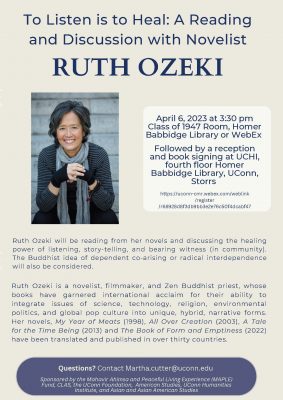A New World Order? A Roundtable on Putin’s Invasion of Ukraine
Panelists: Oxana Shevel (Political Science, Tufts), Ellen Litman (English, UConn), Sara Silverstein (History, UConn)
Friday, April 1 @ 1:00-2:30pm
Zoom (see link below)
A New World Order? A Roundtable on Putin’s Invasion of Ukraine
What are the stakes of Russia’s invasion of Ukraine, regionally and globally? What are conditions on the ground in Ukraine, and what is its impact on Jewish and other minoritized communities in both Russia and Ukraine? How supportive are the Russian people of the invasion? Globally, does it really signal a new world order with a new power bloc centered in Russia and China, with the corresponding erosion of U.S. empire? Why are segments of the political right – in the United States and around the world – enamored with Vladimir Putin? What histories, ideologies, and global relationships do we need to know in order to understand the current conflict?
This panel brings together Professor Oxana Shevel (Tufts, Political Science) into conversation with UConn scholars Professor Ellen Litman (English) and Professor Sara Silverstein (History) to address these and other questions in the hopes of better understanding the current war in Ukraine and its possible afterlives.
Oxana Shevel is Associate Professor of Political Science at Tufts University and President of the American Association for Ukrainian Studies (AAUS). Her research and teaching focus on the post-Communist region surrounding Russia, and issues such as nation- and state-building, the politics of citizenship and migration, memory and religious politics, and challenges to democratization in the post-Soviet region. She is the author of Migration, Refugee Policy, and State Building in Postcommunist Europe (Cambridge University Press, 2011).
Ellen Litman is an Associate Professor of English and the Associate director of the Creative Writing Program at the University of Connecticut. She is the author of two novels, Mannequin Girl (W.W. Norton 2014) and The Last Chicken in America (W.W. Norton 2007). Her scholarly interests include immigrant narratives, contemporary Russian literature, and translation studies. Her fiction, nonfiction, and translations have appeared in American Odysseys: Writing by New Americans, East European Jewish Affairs, Guernica, The Forward, the New Yorker online, and elsewhere. Born in Moscow, she immigrated to the US in 1992.
Sara Silverstein is an Assistant Professor jointly appointed in the Department of History and the Human Rights Institute at the University of Connecticut and is co-director of the Human Rights Institute’s Research Program in Humanitarianism. Dr. Silverstein’s work involves the history of public and global health, internationalism, and minority rights, with a special focus on Eastern Europe. She is completing a book manuscript titled For Your Health and Ours: The International History of a Right to Health and has published on public health, state-building, and internationalism in Eastern Europe.
Join Zoom Meeting
https://us02web.zoom.us/j/86155311333?pwd=MVMxY1kwaGpFMEVKVGxLMTI1N3dYZz09
Meeting ID: 861 5531 1333
Passcode: Lw8tvE
